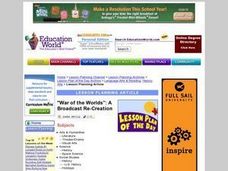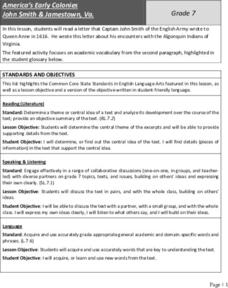Digital Public Library of America
Their Eyes Were Watching God by Zora Neale Hurston
Zora Neale Hurston's novel Their eyes Were Watching God has been highly praised and severely criticized for its depiction of African American folk culture. A set of primary source materials, including photographs, articles, essays, and...
Reading Through History
The Federalist Papers: Federalist Paper No. 10
James Madison, under the pen name “Publius,” justifies the need for an American Republic in Federalist Paper 10, which is perhaps one of the most influential contributions to the Federalist Papers. Readers examine his perspective with...
Digital Public Library of America
A Raisin in the Sun by Lorraine Hansberry
A set of 14 primary sources provides background for a study of Lorraine Hansberry's drama, A Raisin in the Sun. Featured are images from stage productions of the play, white supremacy protests, a clip from a television interview, and...
Briscoe Center for American History
Who Was Mary Maverick?
To begin a study of how to use primary source documents, class members read a brief biography of Mary Maverick, one of the first white women settlers in Texas, and answer comprehension questions based on the reading. The first is a...
Facing History and Ourselves
Literature and Imagination Make Democracy Work
The final lesson in the "What Makes Democracy Work?" series examines the connections between imagination, literature, and democracy. Class members listen to a podcast, read an excerpt from Azar Nafisi's, The Republic of Imagination, and...
Curated OER
"All Together Now" by Barbara Jordan
Cover the topic of race relations with these questions that go with Barbara Jordan's persuasive speech "All Together Now." These reading questions ask readers to think about her speech in a variety of ways by analyzing particular words...
National Endowment for the Humanities
“Twelve Years a Slave”: Analyzing Slave Narratives
Readers of Solomon Northup's brutally frank slave narrative Twelve Years a Slave examine passages that support the argument that slavery "undermined and corrupted" the institution of marriage. Background information is provided by a...
National Endowment for the Humanities
A “New English” in Chinua Achebe’s “Things Fall Apart”: A Common Core Exemplar
To examine the “New English” Chinua Achebe uses in Things Fall Apart, readers complete a series of worksheets that ask them to examine similes, proverbs, and African folktales contained in the novel. Individuals explain the meaning...
The New York Times
Reader Idea | Thinking Like a Historian About Current World Events
Check out this fantastic research project where learners work to see the modern world through the eyes of a historian and analyze a contemporary event of their choice. An in-depth reflection on the project is given by the project...
Humanities Texas
Primary Source Worksheet: Text of “Prouder, Stronger, Better"
Political ads as primary source documents? But of course. Viewers analyze the strategies involved in the Republican Party's 1984 advertisement in support of Ronald Reagan's reelection.
Core Knowledge Foundation
Volume 2 - A History of the United States: Modern Times—Late 1800s to the 2000s
The second volume of the Core Knowledge History of the United States ebook begins by asking young scholars to consider the impact immigration, industrialization, and urbanization had on the United States in the late 1800s. The text ends...
Curated OER
"War of the Worlds": A Broadcast Re-Creation
Why did Orson Welles' 1938 Broadcast of a adaptation of H.G. Wells' The War of the Worlds cause such a panic? To answer this question, class members listen to the original broadcast and research the panic that resulted. They then engage...
National Endowment for the Humanities
The Beauty of Anglo-Saxon Poetry: A Prelude to Beowulf
Riddle me this! What do kennings, caesura, and alliteration have to do with the Nowell Codex? Introduce class members to Anglo-Saxon poetry and prepare readers for a study of Beowulf with a series of activities that includes asking...
National Endowment for the Humanities
Mark Twain and American Humor
“The Celebrated Jumping Frog of Calaveras County” is famous, in part, because it established a uniquely American form of humor. For this famous story, Mark Twain combines the tall-tale, the dialect story, and satire. Here is a resource...
Digital History
Slavery and the Slave Trade
What would it have been like to have heard the debate on the issue of slavery at the Constitutional Convention of 1787? With this resource, you are given the opportunity to read through a reconstruction of speeches on the topic with your...
Carolina K-12
The Mini Page: July 14 is Bastille Day
July 14th, 1789 marked the beginning of the French Revolution and the end of French aristocracy. Read all about Bastille Day with a kids' newspaper that also includes articles on American popular culture, the circulatory system, and...
Academy of American Poets
Teach This Poem: “Making History” by Marilyn Nelson
What makes an event newsworthy, worth a reference in a news magazine or textbook? Who decides? These are questions Marilyn Nelson asks readers of her poem "Making History" to consider. To begin, class members list details they notice in...
Curated OER
America’s Early Colonies: John Smith and Jamestown, Va
John Smith's 1616 letter to Queen Anne of England offers ELLs an opportunity to learn about a bit of early American history. The four-page packet includes the full text of the letter. In addition, the packet includes a worksheet that...
Academy of American Poets
Teach This Poem: "When Fannie Lou Hamer Said" by Mahogany L. Browne
After watching an excerpt from a video of Fannie Lou Hamer's testimony before Congress, pupils do a close reading of Mahogany L. Browne's poem "When Fannie Lou Hamer Said," annotate words and phrases that draw their attention and list...
Curated OER
Abigail as Political and Historical Observer
Lesson five in the series asks scholars to examine letters Abigail Adams wrote about her experiences during American Revolutionary War battles, her thoughts on slavery, and her concerns for her husband.
Curated OER
It's About You
Students build connections between census information and community decision-making by reading a reader's theater script. In this reader's theater lesson, students practice reading fluently and learn about the government. The reader's...
Humanities Texas
Primary Source Worksheet: Grant E. Hamilton, “I Rather Like That Imported Affair”
Political cartoons are primary source documents and learning to read them can be a challenge. Challenge the reading skills of your class with a political cartoon featuring rough and ready, Teddy Roosevelt.
Humanities Texas
Primary Source Worksheet: Lyndon B. Johnson, Excerpt from “To Fulfill These Rights”
"Equal opportunity . . . is not enough." Johnson's 1965 commencement address to the students at Howard University provides an opportunity for participants to see how education was a key element in his vision for civil rights.
Humanities Texas
Primary Source Worksheet: Lyndon B. Johnson and Martin Luther King Jr., Excerpt of Telephone Conversation
Imagine listening in on a conversation between President Lyndon B. Johnson and Dr. Martin Luther King Jr., as Johnson outlines the support he needs from King to pass the legislation required for programs essential for "The Great...

























